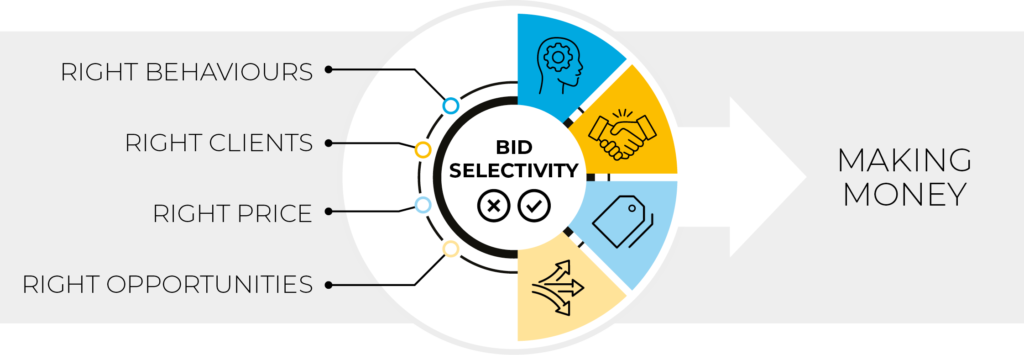Be under no illusions: you are in the business of making money.
How many times have you heard some version of the old adage ‘revenue is vanity, profit is sanity, cash is king’? Well, ignore it at your peril. For me, this should be the mantra of every work-winning team, wherever you are in the world and whatever industry you work in.
Businesses that lose sight of this fundamental truth and start to reward work-winning teams for simply meeting sales targets are at risk of failure. The key to success is to drive profit and cash – not revenue – through the right behaviours, the right clients, the right price, and winning the right business.
Central to this is bid selectivity.

Making the adage stick
Most businesses have some form of work-winning processes, procedures or guidelines that, in theory, embed a degree of bid selectivity. However, if we’re brutally honest, how often are these poorly applied or conveniently ignored?
How many of you have sat in meetings with your bid team muttering ‘why on Earth are we bidding this?’. I have witnessed at first hand too many bid launches where the bid sponsor/executive didn’t know the incumbent or supplier of choice, couldn’t provide a client insight, and didn’t know who was going to make the award decision (never mind what was important to them!). These were all businesses with established, but ineffectual, bid/no-bid processes in place.
In the course of over 35 years working on strategic bids and frameworks for multi-billion-pound corporates, small family-owned businesses and everything in between, it is perhaps inevitable that I have seen the good, the bad and the downright ugly. I quickly concluded that there isn’t a ‘one-size-fits-all’ answer when it comes to work winning and bid selectivity. The right approach will be shaped by a wide range of factors. It is true that key principles and themes will often be consistent – the PAS 360 guidelines touch on these at a strategic level. However, the actual implementation and decision-making processes need to be highly bespoke, reflecting the specific business, its markets and organisational structure, its aims and objectives, and lessons learnt from past successes and failures.
Informed, transparent and accountable
Informed decision-making, transparency and accountability are key to bidding and winning the right business that will deliver the right outcomes.

For me, an effective live business plan should set the parameters of where the business wants to be. It should define the desired business structure and provide a strategic outline of new business acquisition aspirations, including any targeted geographical/sector growth or market penetration. It should identify performance, competency, capabilities and operating parameters to ensure successful delivery.
The criteria defined in your business plan can then be embedded within your decision-making process and used to prioritise the right new business opportunities.
Your business plan needs to be underpinned by aligned governance, incorporating appropriate delegated levels of authority with effective work-winning process, to inform bid selectivity. Any breaks in alignment or lack of transparency and accountability for decision-making will increase the likelihood of failure.
Designing a successful approach
I love simplicity, so will always strive for a laser focus to cut through the white noise. My experience has shown the importance of focussing on four key strands to ensure informed decision-making in relation to go/no-go (typically pipeline and project management) and bid/no-bid (prior to tender) to handover to the delivery team:
- Is it real? Will the opportunity proceed to an award decision? Considerations might include funding, viability, statutory/regulatory approvals, and the client’s drivers.
- Is it winnable? Consider existing relationships, profit and cashflow expectations, your competitors, bid resources, and compelling win strategy/value proposition.
- Is it deliverable? Think about scope and services, geography, delivery resourcing, past performance, and commercial risk profile (red lines).
- What will be the return on bid investment? How much will it cost to bid and what is the projected return?
Focus on bespoke questions aligned to your business plan and ensure that accurate answers are underpinned by transparency and accountability. This is critical in stopping bids that will waste valuable resource and focussing on prospects that are real, will enhance win rates and deliver the profit and cashflow your business expects and requires. The importance of delegated levels of authority in defining accountability cannot be overstated here. To help prevent the ‘ego’ bids we see too often and create the right ownership, those approving or signing off the go/no-go or bid/no-bid recommendations should sit outside the work-winning function.
The governance and approvals process may take minutes, hours, days or weeks – that will be determined by the nature of your business and what is appropriate for you.
When it comes back to incentivising work-winning teams, then yes, definitely reward success, but define success as winning the right business with the right customers, at or above expected business margins, with the right risk profile, and in line with the business plan. Don’t reward in ways that encourage behaviours that may drive up revenue without regard to increased risk, eroded margins and/or negative impact on cashflow.
The bottom line? Bidding selectively, in an informed, transparent and accountable way, will enable you to work smarter, win more of the business that meets your aspirations, and ultimately make more money. It truly is a win-win.
Ken Erskine, Managing Director and Consultant at Big Bamboo Bids, has over 35 years’ experience working on major strategic bids and frameworks across the UK. He has particular expertise in the construction and civil engineering sectors, holding senior roles at Careys, Balfour Beatty, John Sisk & Son, Carillion and Mowlem. Contact him on LinkedIn.



Join the Conversation